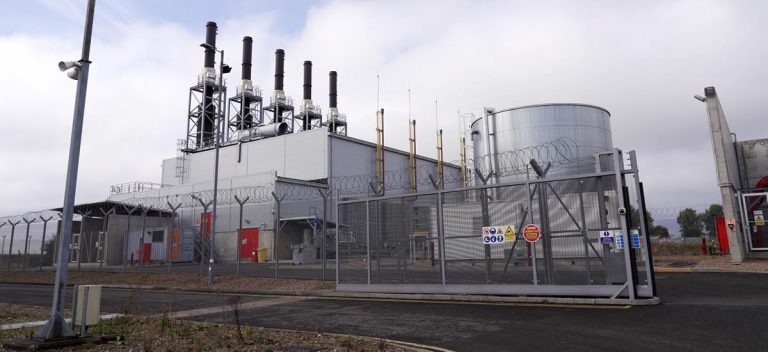Thursday, December 11, 2025
A public exhibition giving an insight into the multi-million-pound restoration of Derby’s historic Market Hall is now open.
The Grade II-listed building is currently being turned into an attractive retail and leisure destination, which will host a wide range of community and commercial activities once it reopens in 2024.
In August, Derby City Council announced that the first phase of work to transform the Victorian building, which first opened in 1866, was complete.
Work has now since started on the second phase, which focuses on refurbishing the interior and developing the exterior public space at Osnabruck Square – a key entrance to the building.
People can now see what has been done so far when they visit Derby City Lab, in St James Street, which is hosting an exhibition by Lathams and Wates Construction offering a sneak peak of the project.
John Forkin, managing director of Marketing Derby, said: “The Market Hall is a beautiful 19th century building, lovingly restored, and we really welcome visitors to the City Lab to get a sneak preview of the work being done.
“When it reopens, it should be one of the city’s main attractions and content will need to reflect the needs of the 21st century customer.”
Lathams, which is leading on the design of the new-look building, and building contractor Wates, which has vast experience of heritage restoration projects, are both working with the city council to deliver the scheme.
Up until Friday 4 November, representatives from both companies will be at the City Lab to give visitors an insight into the work being carried out and discuss all aspects of the project.
In a statement, Lathams said: “This is a rare opportunity to learn about the recent programme of conservation repairs to safeguard the building, and the work being done to transform it into an attractive and flexible market hall and events space.
“Everyone is welcome to come and find out what’s happening, and to see the drawings, visuals and videos on display.”
The City Lab is open Tuesdays and Fridays 10am to 2pm, Wednesdays 12noon to 4pm and Thursdays 2pm to 6pm.
Lathams and Wates are also inviting Bondholders to a special drinks reception, which will take place at the City Lab on Thursday 3 November, from 5pm, where they will be able to learn more about the project.
To confirm attendance please e-mail a.cullen@lathams.uk.com.
Centrica Business Solutions is to start injecting hydrogen into its gas peaking plant in North Lincolnshire as part of a UK first trial with HiiROC aimed at better understanding the role of hydrogen in power production.
The 12-month trial will be part funded by a grant from the Net Zero Technology Centre, which has given 20 projects a total of £8m through its Open Innovation Programme. Each is aimed at developing technology which could reduce emissions offshore, accelerate clean energy production and enable the delivery of the UK’s net zero ambitions.
The 49MW gas fired plant at Brigg is designed to meet demand during peak times or when generation from renewables is low, typically operating for less than three hours a day.
It’s anticipated that during the trial, getting under way later next year, no more than three per cent of the gas mix could be hydrogen, increasing to 20% incrementally after the project. Longer term, the vision is to move towards 100% hydrogen and to deploy similar technology across all gas-fired peaking plant.
HiiROC’s proprietary technology converts biomethane, flare gas or natural gas into clean hydrogen and carbon black, through an innovative Thermal Plasma Electrolysis process. This results in a low carbon, or potentially negative carbon, ‘emerald hydrogen’.
Because the byproduct comes in the form of a valuable, solid, pure carbon it can be easily captured and used in applications ranging from tyres, rubbers and toners, and in new use cases like building materials and even as a soil enhancer.
Greg McKenna, MD of Centrica Business Solutions, said: “Gas still plays a huge role in maintaining a secure, stable supply of power in the UK, with around 40 per cent of our power coming from natural gas. So, it’s vital that we find ways to reduce the carbon intensity of gas plants like that at Brigg.”
Alexander Stafford MP, Chair of the Hydrogen All Party Parliamentary Group, said: “This is the first time hydrogen will be used within a grid connected gas fired power plant in the UK, making this trial an important step forward towards realising the role hydrogen can play in decarbonising our energy system. It is an exciting milestone that will help accelerate the transition to a hydrogen economy and its role in achieving Net Zero. The All Party Parliamentary Group on Hydrogen will be following the progress of this trial keenly.”
Tim Davies, HiiROC’s CEO, said: “This exciting project with Centrica and the NZTC at the Brigg facility will be a first step on the journey to enable the decarbonisation of gas peaking plants. With the continued and crucial rollout of renewable energy generation, intermittency of power supply is a key issue, and the programme we are developing with Centrica will explore routes to address intermittency without generating CO2 emissions.”
UK manufacturers reported a further fall in output in the three months to October, but expect production to pick up in the coming quarter, according to the CBI’s latest quarterly Industrial Trends Survey.
However, with costs growth remaining exceptionally strong and the share of firms citing worries about access to skilled labour reaching a 49-year high, business sentiment fell for a fourth consecutive quarter, and at the fastest rate since the early days of the covid pandemic.
CBI Lead Economist Alpesh Paleja said:“It’s a tough time for manufacturers. Price pressures remain acute, availability of materials is still a big issue – and it is 49 years since manufacturing firms were this worried about being able to find workers with the skills they need. It’s really no surprise that sentiment has deteriorated further.
“Action to address the skills challenge is critical for the sector’s future prospects. Urgent reform to add flexibility to the Apprenticeship Levy would be an important first step for the new Prime Minister, which can rebuild confidence for manufacturers and restore momentum to their investment and growth ambitions.”
Ongo, the Lincolnshire based housing provider, held a Wear it Pink day recently to help raise much needed cash for Breast Cancer Now.
In 2019 Breast Cancer Now and Breast Cancer Care merged together. It is now the UK’s largest comprehensive charity supporting this condition. Their aim is that by 2050, everyone who develops the disease will live and receive the support they need to live well.
Ongo always likes to be involved with various charities from sharing information to raising money for them. Most recently 13 Ongo colleagues took part in the 10-mile Glow walk, which helped raise money for Lindsey Lodge.
Wendy Wolfe, Customer Experience Manager said “I thought it was important to do this event to give support for those people living with breast cancer.
“It’s something very close to my heart after going through this personally, along with other colleagues from Ongo and it really is life changing, not only for the individual affected but also their families/friends.
“I’d like to thank everyone whose helped with promotion, donated prizes, baked cakes or just taken part in some way.
“It’s so important to continue supporting these kinds of events and we couldn’t have done it without everyone’s involvement.
“We are fortunate to work for an organisation who are fully supportive with various charities, and we see colleagues regularly taking part in different events throughout the year to help raise funds”
To find out more about the charity, go to: https://breastcancernow.org/information-support
Local authorities are hoping the rush to pursue investment zone status has not been a wasted effort following the changes at number 10, according to Commercial property experts, LSH.
With the future of Liz Truss’ much feted investment zones (IZs) now hanging in the balance following the Prime Minister’s resignation, local authorities have been left wondering whether a boost to their development ambitions will ever arrive.
Upon their announcement last month, IZs were met with considerable enthusiasm by local authorities. According to research from property consultancy, Lambert Smith Hampton (LSH), some 41 authorities in England have, to date, formally confirmed an expression of interest to host IZs, with many more expected to follow suit.
The expressions of interest for IZ status to date cover over 220 development sites, regeneration areas and growth corridors, alongside vital new infrastructure including ports, green energy production, innovation parks, industrial and commercial space.
To date just two authorities have rejected the notion of IZs outright, with Oxfordshire County Council and Shropshire Council deciding not to pursue opportunities further.
Dr Steve Norris, head of Planning, Regeneration + Infrastructure (PR+I) at LSH, said: “Though the notion of tax incentives to encourage development is nothing new, the decentralised, locally-led nature of IZs could help “turbo-charge” investment. This view appears to be shared by authorities, many of which have been quick to throw their hat in the ring in a bid to accelerate regeneration initiatives.
“Opportunities for local government to secure greater fiscal autonomy and prioritised access to funding are few and far between and not to be passed up lightly. But in a bid to attract new funding, authorities must be mindful of displacing investment from more complex sites, especially in town centres. The Thatcher government’s Enterprise Zones (EZs) in the 1980’s remain a stark illustration of the laws of unintended consequences, as they helped fuel the growth of regional shopping centres, displacing investment and economic activity from many UK towns and cities, and some are still struggling with the consequences 30 years on”.
Though no limit to the number, scope and duration of IZs has been announced to date, given the volume of proposals, it is likely that those that are more ready to deliver and have demonstrated the greatest economic impact, will be given priority and taken through to detailed delivery planning stage. The precise number of zones will depend on these factors, as well as their overall geographical spread and the costs of the programme, in the context of the government’s fluctuating fiscal plan.
Whittam Cox Architects has secured a place in the Top 50 UK Architects and Top 150 UK Consultants rankings for the seventh consecutive year.
Over 300 firms took part in the annual consultant survey by leading industry publication ‘Building Magazine’. The publication has ranked the practice as 80 out of all the firms who made the top 150, which includes Architects, Surveyors, Project Managers, and Engineers.
The firm has also secured a spot at number 40 in the UK’s Top Architects, reinforcing the fact that Whittam Cox Architects is one of UK’s largest practices, servicing clients and projects nationwide.
Whilst the report raises concerns about key issues such as the impact of Brexit, Ukraine and recruitment and what this could mean for the industry, the company remains positive as it continues to work with high profile clients on significant urban residential schemes, particularly Build-to-Rent projects across the UK as well as continued growth with retail frameworks and in the logistics sector.
Commenting on the milestone Board Director Nick Riley said: “We are delighted to be recognised again by Building for the seventh consecutive year; we see this as an endorsement of our employees’ commitment to delivering tangible value and the very best outcomes for our clients.
Looking ahead we know we can’t be complacent; it’s essential we remain progressive by being ambitious, agile and responsive through continued times of political and market uncertainty.”
Whittam Cox Architects is also involved with Chesterfield’s Property and Construction Group, which brings together businesses working across the sector in our town.
Board Director Andy Dabbs currently chairs the group, working alongside Destination Chesterfield to host networking events, forums and drive forward further investment in the area.
Whittam Cox Architects supports the marketing and economic growth of the town through Chesterfield Champions, a network of over 200 organisations across Chesterfield and North Derbyshire.
“I congratulate Rishi Sunak on becoming Prime Minister. The focus must now be on stabilising the economy, delivering the promised support for small firms on energy bills and cutting National Insurance, and on securing growth and prosperity in the medium and long term.
“The political turmoil at Westminster must end, and attention switch to the real world in which small businesses and the self-employed are being hammered by soaring costs, falling revenues, and diminishing availability of affordable finance.
“With recessionary pressures acute for small firms, pro-business measures will be needed to secure prosperity in the medium and long term. That includes the right tax and regulatory framework, including keeping pre-profit taxes such as Business Rates and National Insurance as low as possible.
“Policies should also support improving broadband and local road infrastructure, housebuilding, and labour supply.
“Soaring energy bills have been uppermost in the minds of many small business owners in recent months. The promised energy support package for small business owners must be delivered swiftly, followed by a plan for what happens after the initial six months of support which takes a realistic view on the inherently vulnerable position that smaller firms find themselves in when dealing with energy suppliers.
“In the last two years the UK’s small business community shrank by half a million. While the reversal of the hike in national insurance is welcome, it’s a bitter blow to the directors of small companies paid through dividends to be excluded from this. These hard-working entrepreneurs were left out of Covid financial support and now face this tax rise, in many cases alongside a jump in Corporation Tax.
“At a time of pressure on public finances, the new Prime Minister could take the opportunity to improve cashflow for vast numbers of small firms without a cost to taxpayers – and that is through action to tackle poor payment practices in supply chains. Late payment of invoices – often by bigger businesses to their smaller suppliers – leads to the shutdown of 50,000 businesses a year. Over the last three months more than half (54%) of small firms have been the victim of late payments.
“There’s an easy win for the Government and small businesses here if ministers double down on blacklisting big business offenders from winning taxpayer-funded contracts; as well as making audit committees of big firms directly responsible for their company’s payment practices.
“Small business entrepreneurs are resilient and innovative, but the current headwinds are gale-force. For small firms to drive economic recovery and future prosperity, they need a pro-small business environment in which to operate and grow.”
Paul Davis, Partner and Head of Litigation at Leicester based BHW Solicitors, has been appointed as a Deputy District Judge on the Midlands Circuit. Paul will be sitting as a Judge 2-3 days a month, alongside his busy litigation practice at BHW.
Paul qualified as a solicitor in 2012 and specialises in commercial litigation, property litigation and contentious probate. He became Head of Litigation at BHW in 2019 and since then has overseen a rapid expansion of the Litigation Department, which has become one of the most respected teams in the region. The department’s work was recognised by the leading independent law firm guide, the Legal 500, for the first time earlier this year.
Commenting on his appointment, Paul said: “I am delighted to get through the very competitive process and be appointed as a Deputy District Judge, which involved numerous challenging tests in a selection process that lasted over 12 months.
I look forward to carrying out this important work alongside my job as a solicitor at BHW”.
Deputy District Judges are appointed by the Lord Chief Justice after a fair and open competition administered by the Judicial Appointments Commission. Applicants must have a minimum of 5 years appropriate legal experience, such as a practising barrister, solicitor or legal executive.
Deputy District Judges sit in the County Courts and District Registries of the High Court for around 30 sittings a year. Paul will sit within the Civil Jurisdiction where he will preside over a wide range of disputes such as possession claims, contractual disputes and insolvency proceedings.
Appointments are for four year renewable terms until the statutory retirement age of 75.
Chesterfield has a unique offering and continued collaboration between the public and private sectors is critical in ensuring growth does not stop, according to a panel of industry experts.
Speaking at national contractor Willmott Dixon’s second ‘Towns of the Future’ roundtable – hosted at Tapton Park Innovation Centre – the 10-person panel discussed topics including the current building stock, skills, talent retention and investment.
It was agreed that identifying challenges in regeneration projects and collaborative working by the public and private sector can unlock potential hurdles.
The panel agreed conversations taking place are very encouraging – something, which is especially important at a time when regeneration projects amounting to a value of more than £1 billion are in progress.
Jerry Major, regional framework manager at Willmott Dixon, said: “Chesterfield has great potential and, because local authorities now understand what the private sector can offer more than ever before, the opportunity to make the most of different areas and create mixed-use developments is being unlocked.
“It’s vital that businesses in Chesterfield, both big and small, play an active role in promoting the careers available here and the opportunity to lead a fulfilling lifestyle. While we have been involved in projects in Chesterfield in the past, we understand the importance of maintaining our relationship with the stakeholders here and offering an advisory role to the public sector organisations in need of regeneration expertise.”
As part of the discussion, there were several references to Chesterfield Waterside and the Staveley Town Deal, though questions centred around what went right and wrong for Chesterfield in 2022, how can more attention be generated on what is happening in Chesterfield and what the focus of growth should be in Chesterfield over the next 10 years.
Dominic Stevens, manager at Destination Chesterfield, said: “Chesterfield has a clear growth plan, place story and sense of identity. The vision for Chesterfield has been in place now for more than a decade and we continue to see the positive results of this plan.”
“Looking forward to the next 10 years, it was excellent to hear people from different areas of industry agree on the importance of meeting the needs and desires of the next generation. We must ensure that development and regeneration lead to inclusive sustainable growth and Chesterfield continues to be a great place to live, work, visit and invest.”
Ivan Fomin, managing director at MSE Hiller and Chair of Staveley Town Deal said: “Effective collaboration can ensure that the potential benefits of the many regeneration sites are maximised.
“The public and private sector working together ensures developments keep moving forward while different sources of funding are available to gain.
“More relationships need to be formed so that it is not a small market competing for work, because there is so much potential here that we must all help to realise.”
Building on the success of Willmott Dixon’s two roundtables in Chesterfield this year, the national contractor looks to continue engagement with a range of stakeholders.
The panel was chaired by Liz Cartwright (Cartwright Communications) and featured Jerry Major (Willmott Dixon), Adam Rodgers (Marketing Derby), Ivan Fomin (MSE Hiller and Destination Chesterfield), Peter Swallow (Destination Chesterfield), Dominic Stevens (Destination Chesterfield), Duncan Hogg (Bond Bryan), David Kemp (DLP Planning) and Amy Revell (We Are Spaces).
Derby-based law firm Right Legal Group has been named ‘Will Writing Organisation of the Year’ at the National Paralegal Awards 2022.
The event, which took place on Saturday 22 September at The Grand Hotel in Birmingham, saw the law firm nominated for three awards. On top of taking home the win for Will Writing Organisation, Right Legal Group were highly commended for the ‘Best Law Firm – Paralegal Development’, and its legal advisor Olivia Haleem was named a finalist for ‘Best Will Writing Paralegal’.
Carrie Caladine, managing director at Right Legal Group, said: “We are thrilled to announce that, after much anticipation, Right Legal Group was awarded Will writing organisation of the year 2022.
“As a law firm specialising in Wills and Probate, we are committed to changing the way that people think about making a Will, preserving memories not just money.
“To be recognised for this and rewarded for our unique offering in the private client field, through our RightWill service, fills us with immense pride. We cannot thank those enough who were involved in celebrating the awards and championing what we do at Right Legal Group.”
Within the last year, Right Legal Group has heavily expanded its Training Academy and is now responsible for training around 30 new advisors each quarter, providing them with the knowledge, support and skills they need, in order to keep more families together with the RightWill service.
Carrie added: “We cast our nets far and wide when looking for people to join our business and we are proud to be able to give professionals a start to their career through our accredited training programmes.
“We are very passionate about ‘growing our own’ people and cannot wait to see what’s in store for our Paralegals as they develop further along the advisor journey.”












